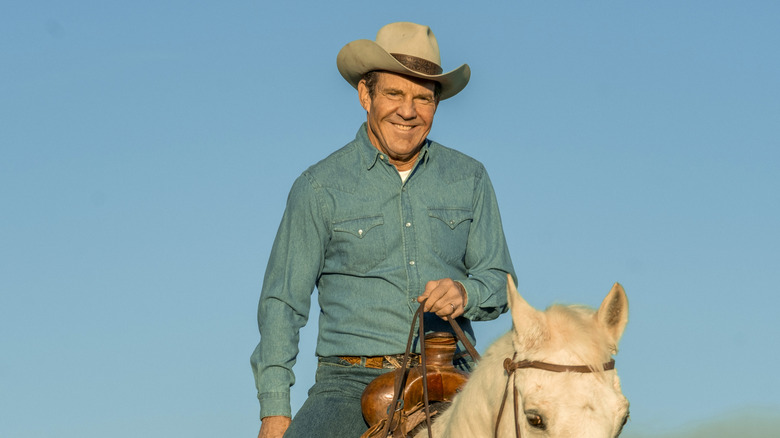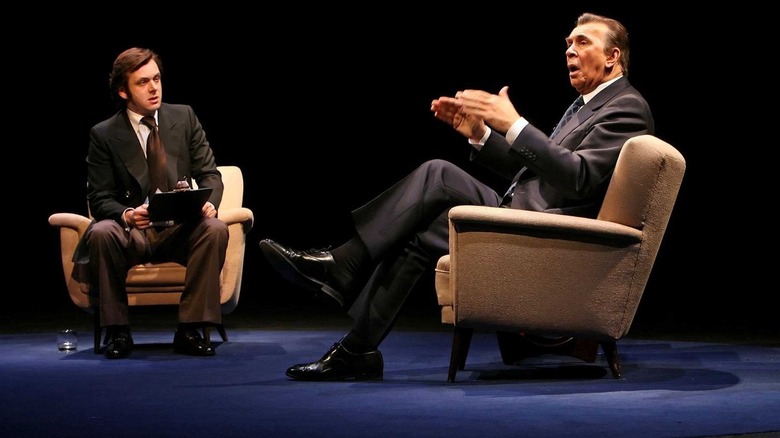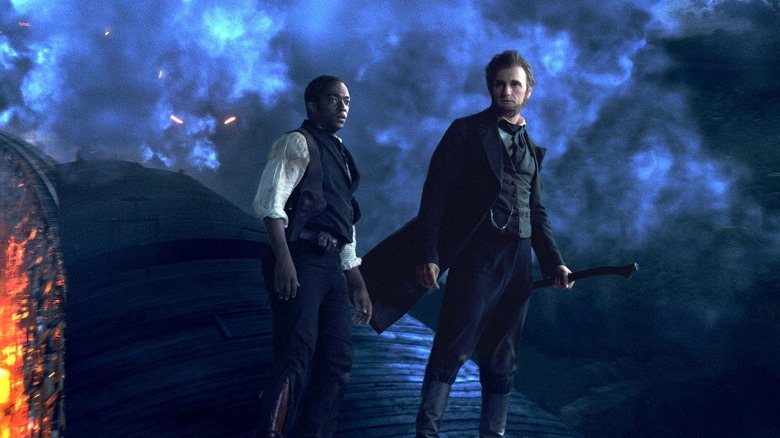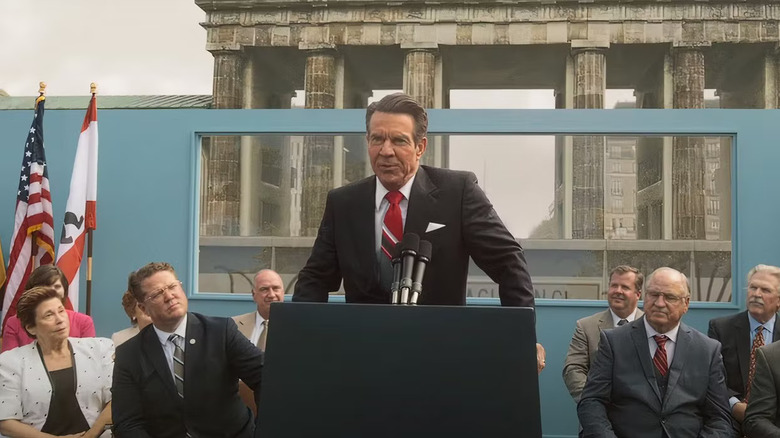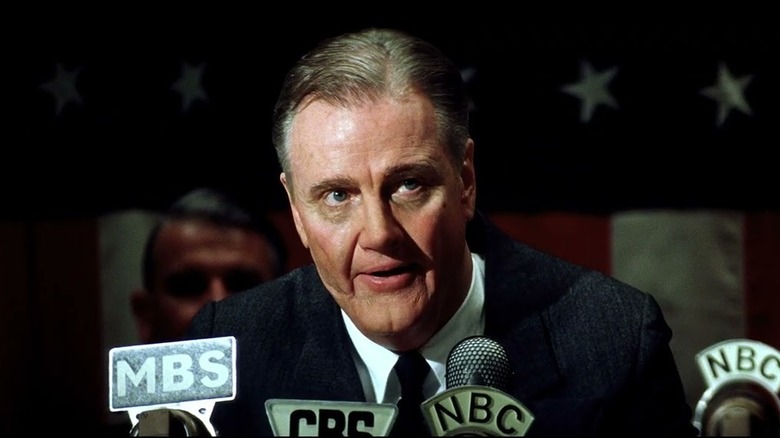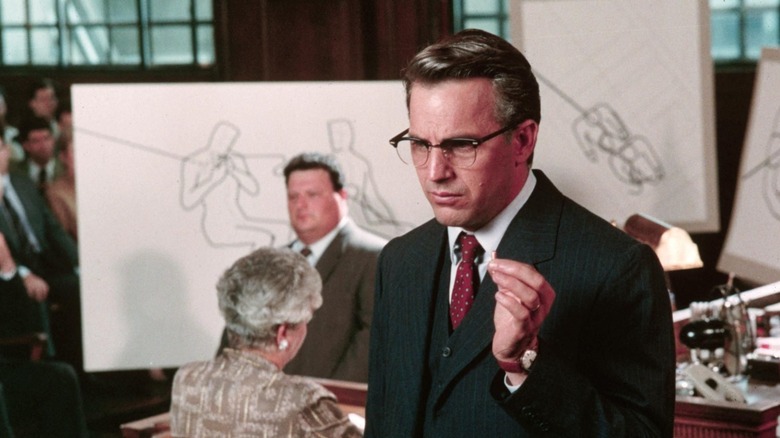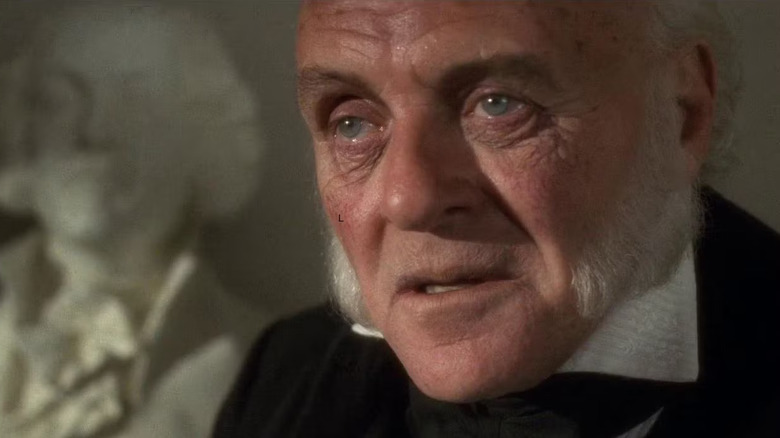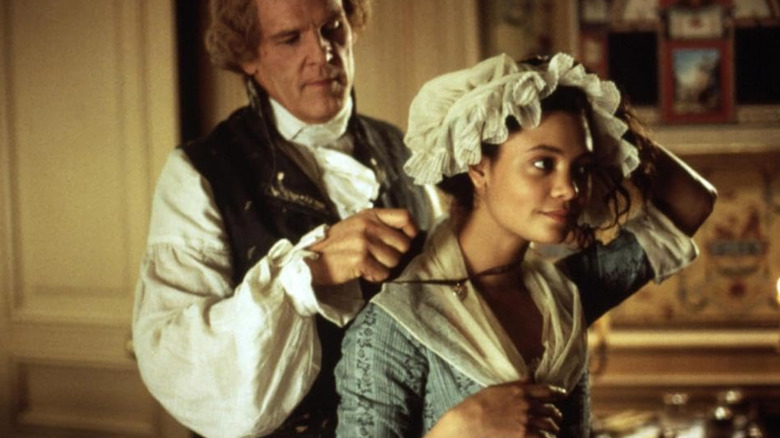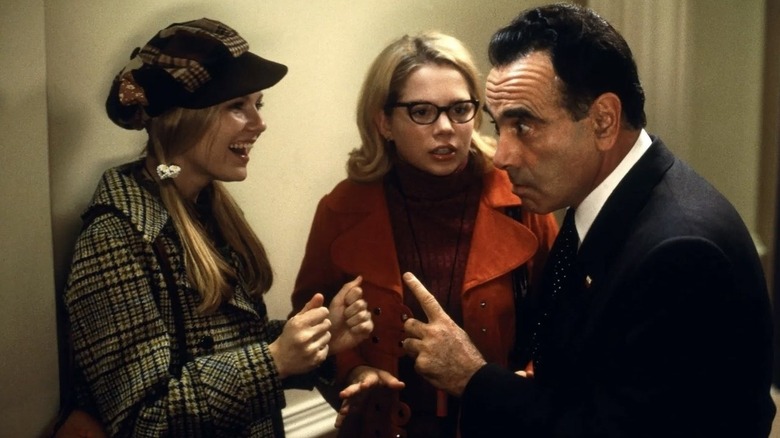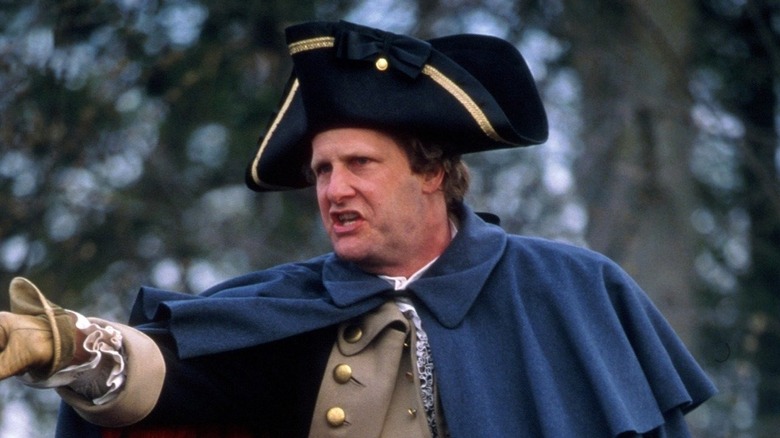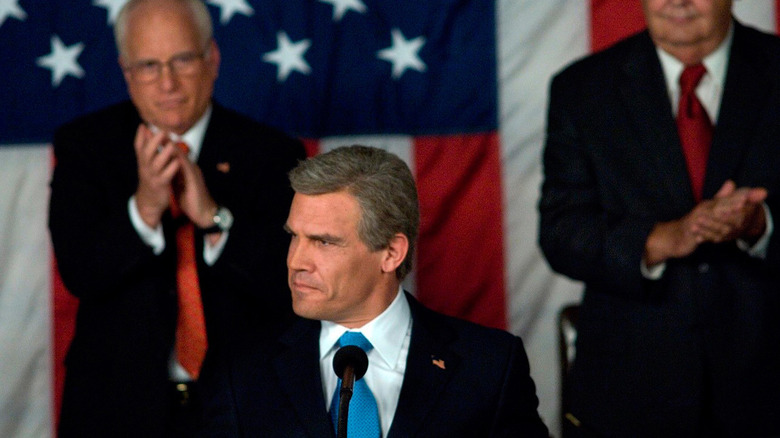Movies About Presidents That Historians Absolutely Hate
Presidential movies are prime territory for drama. You've got someone in an incredibly fast-paced world, making major life-or-death decisions, at least on occasion, and often surrounded by a cast of characters with their own agendas. A president can dramatically change the course of history depending on what they say in a given moment. They might also be embroiled in plots and conspiracies that more or less write their own film script. Really, the only complaint on-set may be from the costume department, as presidents aren't known for flashy get-ups.
But making a movie about real-life occupants of the Oval Office can prove to be especially thorny, as presidential historians can readily tell you. While some filmmakers have been able to make movies about living or dead presidents with little incident, as far as those in the know are concerned, others simply just couldn't help but inject a little drama that wasn't there in the first place. For instance, did George Washington, the first president who's so beloved in American history that there's a mural showing his ascension to godhood in the U.S. Capitol, really pull a gun on a troublesome general? Should we truly believe what Oliver Stone has to say about the JFK assassination, or was he just spinning out what he thought was a cool story? And precisely how villainous was Richard M. Nixon, anyway?
These movie situations may make for intriguing viewing, but chances are you don't want to write a term paper based on them.
Frost/Nixon didn't quite get the relationship right
The 1977 interview between journalist David Frost and highly questionable former president Richard Nixon is already a dramatic affair, given that Nixon seemingly confessed to his wrongdoings by bluntly declaring that "when the president does it, that means it's not illegal." So, of course it was prime material for 2008's "Frost/Nixon," directed by Ron Howard. But, while Sir David Frost was a very real journalist and Nixon was one of the most notorious presidents in U.S. history, the film depicting their famous marathon interview isn't quite on the level.
While the real-life Nixon delivered this confession in an almost mundane fashion (prickly moments aside), the film version of the president (played by Frank Langella) spits it out with menace. Meanwhile, the actual Frost recalled Nixon not as a plotting villain, but a bit of an awkward weirdo. "He was the most fascinating man," Frost later recalled. "There's never been anyone who was such an enigma in the Oval Office" (via BBC).
Dramatic license, maybe, but then there's the matter of the money. "Frost/Nixon" isn't shy about Frost bagging the interview because he was the highest bidder, but does skip over the part where Nixon not only got a $600,000 fee, but a further 20% cut from syndication of the interview. Frost didn't really back Nixon into a confession corner, either; instead, Nixon's quasi-admission of guilt was allegedly all part of the plan crafted not just by Frost but by Nixon's team.
We all know Abraham Lincoln: Vampire Hunter isn't accurate, right?
Okay, who really expects a movie named "Abraham Lincoln: Vampire Hunter" to hew closely to the historical record, anyway? But the weird thing is that sometimes it does get things right, earning plaudits from the Architect of the Capitol for getting the 1865 state of the Capitol Building correct and providing a broadly correct portrait of an ambitious, articulate Lincoln. This surely makes the inaccuracies all the more galling.
But beyond the vampire bits — let's just establish that vampires didn't help the Confederacy — there are other oddities you might miss. No, Lincoln was never in attendance at the Battle of Gettysburg, as the film shows. Instead, he was there months later to deliver the Gettysburg Address. And it's not really possible he would have been able to almost-magically demand all the silver in the Union (vampires or otherwise).
Perhaps the most galling part of the movie is its treatment of slavery. Lincoln is depicted as a heroic anti-slavery activist who treats a Black associate, William H. Johnson, as an equal. In real life, Johnson was a servant and free man whom Lincoln arranged to have buried in Arlington National Cemetery, but they weren't best buds. Lincoln himself had complicated and evolving views on the rights of Black Americans. One might also argue that using demonic vampires as stand-ins for real Southerners is hardly flattering and doesn't get at the complexity of some situations — but again, the movie has Abraham Lincoln wielding an axe against the bloodsucking undead, so perhaps historians should let this one fade into obscurity.
Reagan conveniently skips over the awkward bits
Lest you think historically awkward presidential movies are a thing of the past, you need only turn to 2024's "Reagan." True to the name, this film is a biopic of the 40th president, so long as you look at the real Reagan's record with one eye closed and maybe occasionally shut the other one for good measure.
As played by Dennis Quaid, former actor Reagan comes across as a modern saint who might as well have put on a cape, flown himself across the globe, and challenged all anti-America baddies to fisticuffs — which they would definitely lose. But while he definitely came to political prominence in part for his anti-communist stance, some questionable things about Reagan's presidency and previous political record curiously don't make it into the film. There's no mention of his pushback against the 1964 Civil Rights Act and the 1965 Voting Rights Act, for instance.
Neither does it really touch on his campaigns and budget cuts that disproportionately affected poor Americans and people of color, from his foray into the war on drugs to his attempts to do away with Medicare, to an unfulfilled promise to dismantle the Department of Education. Likewise, in the film there is little more than the barest hint of another major folly of the Reagan era: his administration's mishandling of the HIV/AIDS pandemic. Nearly 90,000 people died due to this illness, and yet little happened other than a December 11, 1984, press briefing in which acting press secretary Larry Speakes laughed about the matter.
Pearl Harbor is a big old mess, including the FDR scene
When it comes to movies dripping with inaccuracies, few hold a candle to "Pearl Harbor." This 2001 movie purports to tell the story of the December 1941 attack on the Pearl Harbor naval base on the Hawaiian island of Oahu, but beyond the broadest of strokes, there's not much to cite here (unless you want a big F stamped on your next history essay).
Then, there's the depiction of President Franklin D. Roosevelt, as played by Jon Voight. In one scene, he's meeting in a war room of sorts, receiving a briefing on the attack and its aftermath. One advisor warns of a possible Japanese invasion, but no one at the time reasonably believed that Japan was going to attempt a takeover of the mainland U.S., not least because Japan's military capabilities simply weren't up to such a gargantuan task.
Then, there's the part of this particular scene in which FDR dramatically hauls himself to his feet, struggling against the paralysis caused by a 1921 bout with polio as the soundtrack swells. But though FDR more or less convinced Americans he could walk, no one in his inner circle would have been impressed by such a feat, as FDR routinely demonstrated serious upper-body strength by moving himself around under much of his own power. Nor is there any indication that he ever tried to wow anyone by simply standing or otherwise using his partial paralysis as a dramatic device.
The conspiracy in JFK isn't exactly accurate
Few things make presidential historians more ready to throw down — or run away — than a JFK assassination conspiracy. Part of the reason these ideas are still around more than 50 years after the 1963 assassination has to do with the Oliver Stone film, "JFK."
Where to start with this one? The 1991 film, which actually focuses on the aftermath of the assassination, first presents JFK as such a radical that he was targeted for assassination by his own government. However, JFK was hardly a leftist or Communist sympathizer; some modern commentators have even wondered if he might align more with today's moderates or even conservatives (though that's highly theoretical).
Beyond that, the film's government conspiracy to assassinate JFK is almost entirely made-up. The bits that are sort-of based in truth, like character William O'Keefe's confession, are so wildly twisted from reality that historians — and you — simply can't take it seriously (O'Keefe's real-life counterpart, Perry Russo, only delivered a more interesting testimony after he was given sodium pentothal, a barbituate). Meanwhile, legitimate ballistics experts broadly don't buy into the "magic bullet" theory presented in the film's courtroom. Though the Warren Commission's investigation of the assassination is marred by allegations of government whoopsies and coverups, it's hardly opening the door to whatever is presented in "JFK." Even Stone himself has admitted doesn't really know what happened during the assassination and that, essentially, the "JFK" film is based on vibes.
Amistad oversimplifies many things, including John Quincy Adams
Though Steven Spielberg and his team deserve credit for making "Amistad," the 1997 film about a real 1839 uprising on a slave ship, it's still not something to hang your history hat on. That includes the appearance of the especially long-lived former president John Quincy Adams, who defended the group of Africans who took over the Amistad and were facing murder charges as well as extradition back to Spanish territory. The real Adams convinced the U.S. Supreme Court they were free men, securing their return to Sierra Leone.
However, unlike the film's presentation, this wasn't a major point where U.S. opinion turned against slavery. Given the American Civil War, it's clear that Adams' arguments didn't close the matter. Some of the same justices who presided over the Amistad trial ruled in the 1857 Dred Scott case that enslaved people were not American citizens.
To focus back in on Adams, "Amistad" makes it seem as if he weren't all that interested in taking on the defense in the first place. Yet, in real life, Adams was an abolitionist who volunteered to speak for hours before the Supreme Court. Moreover, a key part of his argument was that the U.S. president did not have the power to send citizens to trial in another nation. Therefore, Adams argued, then-President Monroe didn't have the right to send other humans to a similar fate, as they had a right to their freedom. Curiously, the argument doesn't make its way into the film.
Jefferson in Paris contains some very uncomfortable inaccuracies
Given its 1995 debut, you could at least give "Jefferson in Paris" credit for discussing the often-disregarded relationship between Thomas Jefferson and enslaved woman Sally Hemings. We now know that Hemings, who traveled to Paris with Jefferson from 1787 to 1789, had at least six children fathered by the second president. People talked about it during Jefferson's lifetime, but it didn't enter the broader public story until the late 1990s. That's when genetic testing all but confirmed that Jefferson fathered Hemings' youngest known child, Eston.
Unfortunately, the movie itself isn't all that accurate, and not just because Jefferson is played by Nick Nolte, who to many mostly just looks like Nick Nolte in a wig and not a Founding Father. For one, Hemings would have been about 14 at the time, though she was played by a then-23-year-old Thandiwe Newton. One can imagine this being a conscious change for the sake of audience approval.
While the real Jefferson, then widowed, did develop a close relationship with married artist Maria Cosway during this time, it doesn't appear to have progressed much beyond walks and yearning letters in which he strikes down the idea of anything more. Meanwhile, the film has French people smugly pointing out racial inequality in American society, even though the French colony of Saint-Domingue was home to hundreds of thousands of enslaved people and saw a 1791 slave revolt that led to the founding of Haiti.
Dick isn't accurate at all, but at least it's fun
Okay, it's true that 1999's "Dick" is obviously a comedy and perhaps not a movie that we should take all that seriously. After all, it posits that the source who broke the news of Watergate, the infamous "Deep Throat" who passed on vital information to Washington Post reporters Bob Woodward and Carl Bernstein, is actually a pair of teenage girls played by Kirsten Dunst and Michelle Williams.
Just so we're clear, in our reality Deep Throat was FBI assistant director W. Mark Felt, whose identity was only revealed by his family in 2005. Still, it's not as if you're going to see this in your next history class. Besides the improbability of Williams' character briefly falling in love with Richard Nixon (are we perhaps looking at two different presidents named Nixon?), there's also the silly notion that the two could somehow wander around the White House and accidentally make their way into the Oval Office.
Security back in the 1970s wasn't quite on the same level as today, but Nixon was famously paranoid to the point of bugging his own workplace. Would he really have allowed a couple of high schoolers to wander about, much less become official dog-walkers? Plus, with multiple presidential assassinations and assassination attempts in the history books, not to mention the Cold War and Nixon's growing unpopularity, the Secret Service and other security personnel at the White House were certainly stepping up their work.
The Crossing is pretty good, save a major oversight
When it comes to television movies about presidents, you could certainly do far worse than "The Crossing." In this 2000 film that aired on A&E, Jeff Daniels plays the first U.S. president struggling through the events around the highly consequential Crossing of the Delaware and Battle of Trenton. It's generally considered to be historically accurate, but there are at least a couple of major oversights that could get a historian all out of joint.
The biggest may be the claim that the Continental Army saw no casualties at all during the crossing or battle. In fact, there were at least six. One of that number was none other than future president James Monroe, who suffered a major shoulder wound during the Battle of Trenton, but clearly survived.
Then, there's a scene where Washington pulls a gun on Horatio Gates, who was admittedly a troublesome man and one of the worst generals of the American Revolution. But, as annoying as Gates may have been, there's no record that he was nearly shot by Washington before his dismissal. Meanwhile, if you really feel like being nitpicky, as good as Jeff Daniels may be, he still mostly sounds like American actor Jeff Daniels. The real Washington's voice was obviously never recorded, but may have had more of an English tilt to it, as well as reportedly a bit of weakness and mumbling due to recurrent upper respiratory infections and those infamously bad teeth of his.
W. already has some historians worried about accuracy
Further staking his claim in the world of dubious presidential film accuracy, here's Oliver Stone again. This time, he placed his sights on more recent history with "W.," the 2008 film that came out while its namesake, 43rd President George W. Bush, was still in office (44th President Barack Obama would officially take over on January 20, 2009).
With so much recent and fairly well-documented history going on, could "W." be all that inaccurate? Stone brought on advisors who had worked in the Bush administration to ensure accuracy, including retired Rear Admiral Deborah Loewer, who not only managed key operations like the White House Situation Room, but was also traveling with Bush on September 11, 2001. Loewer told Politico that the visual details of the Situation Room were highly accurate and that Josh Brolin, who played the president, took care to get his impersonation of the real-life Bush just right.
But others claim that Stone is guilty of manipulating history, including making Bush seem like an affable goof caught in a tough spot and vice president Dick Cheney (played by Richard Dreyfuss) a silently looming villain. You might conclude that's all due to personal bias and not necessarily historical accuracy, but there are more obvious missteps, like not including September 11 at all. Bush's infamous "fool me twice" flub does make it into the movie, but instead of happening in front of a crowd, he stumbles over the line in a private meeting.
